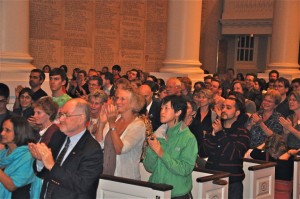
Jonathan Kozol brought the house to its feet with his stories about his friends, children of the South Bronx, and their struggle for educational justice. (Photo by Larry Aaronson)
By Alain Jehlen
Whatever happened to Pineapple?
Pineapple is the pseudonym Jonathan Kozol gave to a spunky, bossy, charming girl he first met in a South Bronx kindergarten.
Kozol has told her story in several of his passionate books denouncing the conditions in which poor, inner-city children of color are educated. On September 19, he revealed how Pineapple’s life is working out.
Kozol was speaking to 800 people who packed Harvard’s Memorial Church for the Citizens for Public Schools Mary Ann Hardenbergh annual lecture. Mary Ann was a formidable campaigner for equity in public schools, a former member of the state Board of Education and a CPS leader for many years.
The audience, many of whom were educators or aspiring teachers, responded throughout the talk with enthusiastic waves of applause, cheers, and even tears as Kozol spelled out his potent narrative of the deep inequities in the way children are educated in our society.
Kozol has campaigned for fairness and opportunity in public schools ever since the 1967 publication of his first book, Death At An Early Age, based on his experiences as a Boston public school teacher.
In his new book, Fire In the Ashes, Kozol follows up on Pineapple and other South Bronx children whom he met and wrote about decades ago.
Some of the children’s lives ended tragically, especially, he said, some of the boys.
He remembered one boy he first met in a homeless shelter at the age of nine, a boy who was always hungry. Kozol would bring cornflakes and milk when he visited. “I remember the way he used to wolf it down,” Kozol said.
That boy, Kozol said, killed himself at a time of desolation when he was a teenager. Another boy died of a heroin overdose. A third was killed “surfing” a subway car – riding on the roof – when his head hit a steel beam.
But some of Kozol’s young friends, he said, “battled back courageously, with the help of teachers and other adults who intervened at crucial moments in their lives.”
Pineapple was one of those.
When she was in fifth grade, Kozol discovered she could barely read a sentence longer than four words. He was amazed. He had assumed she could read because she was so bright and articulate in conversation. “Pineapple was artificially retarded by the City of New York,” Kozol said.
“Class size at her school was 32, 34, 36. Teachers understandably didn’t stay long.” Today, he said, some classes are even bigger. In Los Angeles, he visited a teacher a few years ago who had 40 students and 30 chairs. This year, that teacher told him she has 45.
“I have wealthy friends in New York who insist to me that class size doesn’t matter for inner-city kids if, as they usually say, ‘those kids would buckle down, and if their parents did their job, and if their teachers did their job.’
“I ask them where their own kids go to school, and how many children are in their classes.” In the leafy suburbs of New York, he said, classes have 15 or 16 children and parents start to panic if the number reaches 20. Andover and Exeter boast class sizes of 12 or 13.
“If very small class size, and the individual attention it enables a good teacher to give to every girl and boy, is good for the son of a prosperous attorney or the daughter of a CEO, then it’s good for the poorest child in America,” he said.
But Pineapple got lucky. She charmed not just Kozol, but also an Episcopal priest, and the priest used her connections to get Pineapple into an expensive prep school for wealthy children.
In that school, classes were small so “the teachers had the opportunity to enjoy Pineapple’s personality.” Pineapple worked hard and her teachers worked hard, and she jumped forward in her learning. She eventually won a college scholarship and entered her senior year this fall.
Pineapple succeeded, Kozol said, because “she won the hearts of grown-ups who were well-connected.” But the lesson, he said, “is not that we should celebrate exceptionality of opportunity. Charity is not a substitute for justice. It’s too precarious, too selective. Only the highest level of free and equal, universal, non-selective public education can ever close the gap between the very poor and the very rich. … And that’s why I’m sticking with the union.”
Kozol deplored many of the measures advocated by education “reformers” for teaching low-income children: the use of rigid scripted curricula, short meaningless phonics passages instead of real literature, standardized tests which are misused to judge student progress and teacher performance, and segregated charter schools that are more about hype than quality or equity.
What’s next for Pineapple? She’s going to stay in school an extra year past graduation so she can get certified and go back to the South Bronx to teach in a public school. As she told him with a shy laugh, “It’s like that quote from Dr. King…I want to pass the torch.”
[To return to the Backpack, minimize browser.]

